六年级英语上册 重点总结 冀教版
冀教版六年级上册英语知识点

冀教版六年级上册英语知识点冀教版六年级上册英语知识点概述一、词汇学习1. 学校相关词汇:classroom, teacher, student, desk, chair, blackboard, library, etc.2. 家庭和人物描述:family, parent, grandparent, cousin, tall, short, thin, etc.3. 日常活动:get up, go to school, have lunch, play, do homework, go to bed, etc.4. 食物和饮料:apple, banana, chocolate, milk, tea, coffee, etc.5. 动物和自然:dog, cat, elephant, tiger, mountain, river, sea, etc.6. 职业和地点:doctor, nurse, farmer, bank, supermarket, park, etc.7. 交通方式:car, bus, bike, walk, train, plane, etc.8. 季节和天气:spring, summer, autumn, winter, sunny, rainy, snowy, etc.9. 数字和时间:numbers 1-100, o'clock, half past, quarter past, etc.10. 常见形容词和副词:big, small, fast, slow, often, usually, etc.二、语法要点1. 一般现在时:表示经常发生的动作或状态。
- 例句:She usually goes to school by bus.2. 一般过去时:表示过去某一时间发生的动作或状态。
- 例句:He visited his grandparents last weekend.3. 现在进行时:表示正在进行的动作。
冀教版六年级英语上册全册重点知识点

冀教版六年级英语上册知识点第一单元本单元学习目的:学会如何询问时间;询问对方想要吃什么的句型;there be句型以及现在进行时。
一、词汇:三餐: breakfast(早餐) lunch(午餐) dinner(晚餐)代词: me(我)(I的宾格形式) him(他)(he的宾格形式) them(他她它们)(they的宾格形式)其他:home(家)time (时间)clock(钟表)house(房屋;房子)study(书房;学习)kitchen(厨房) toilet(坐便器;卫生间)floor(地板;楼层)there(在哪里)(表示存在或发生)table(桌子) put(放;安置)half(一半;半数)dirty(脏的)card(纸牌;卡片)Mr.(先生)(用于男子的姓氏或姓名前)Mrs.(夫人;太太)(用在已婚女子的夫姓或夫的姓名前)二、习惯搭配:live in ...住在......play cards玩纸牌come to ...来到......look out小心,当心go to school去上学go home回家make dinner做晚餐after lunch午餐之后in the fridge在冰箱里on the table在桌子上on the first floor在一楼half past seven七点半三、知识点:arrive at+小地点(机场、车站等)(到达)in大地点(国家、省、市产)四、常用表达:1. There he is!他在那儿!2. Come in, please!请进!3. Nice to see you!很高兴见到你!4.Time for dinner!晚餐时间到了!五、重点句型:1.如何询问时间: What time is it?-----It’s+时间eg: What time is it? It's five o'clock.2. There be 句型(be动词的选择采用就近一致原则):There is a book on the desk.There are two bedrooms and a living room on the second floor.3.如何询问某人想要吃什么:What would + 主语+ like for breakfast / lunch / dinner?主语+would like+其他.举例eg:1.What would you like for breakfast?I would like some bread and milk.2.What would he like for lunch?He would like noodles and meat.4.询问某人正在做什么:What are / is +主语+ doing?主语is / am/ are +动词-ing+其他eg:1.What are you doing?I'm doing my homework.2.What is your mother doing?She is cooking dinner.第二单元本单元学习目的:掌握名词单数变复数的变化规则;熟练运用常见的频度副词,知道如何询问并回答天气情况和温度以及学校的课程安排。
冀教版六年级英语上册知识点总结

培优学堂小升初毕业班毕业升学总复习冀教版六年级英语上册知识点总结一单元一、单词:live(单三)lives,want(单三)wants,half kitchen house toilet bedroom,living room bathroom study(复数studies)fridge dish(复数dishes)反义词:dry-wet,dirty-clean,come(现在分词)coming make(现在分词)making cook(现在分词)-cookingwatch(现在分词)-watching sit(现在分词)-sitting read(现在分词)-reading,write(现在分词)-writing do(现在分词)-doing play(现在分词)---playing,二、课文重难点:1.at+较小的地点如at school、at home in+大地点in China in Beijing2.This is“这是….”用来介绍他人。
This is my friend,Li Ming.3.want想要want to do…想干…..如:I want to fly kites.我想放风筝。
4.Li Ming’s plane will arrive at five o’clock.几点几分用at5.What time is it now?It’s half past five.现在几点了?现在5:30.6.Did you have a good trip?Yes,thanks.but I’m tired你旅行愉快吗?是的,谢谢。
但是我有些累。
7.Let’s go home./Let me help you.让我们回家。
让我帮助你。
8.learn English/Chinese学英语/汉语9.This is/That is/These are/Here is/Here are10.I will show you the rooms in my house.我将领你们参观房子的各个房间。
冀教版六年级英语上册全册知识点汇总

冀教版六年级英语上册全册知识点汇总UNIT Li Ming Goes to Canada一、核心词汇1.和家或房间有关的单词home 家clock 钟表house 房屋;房子study 书房;学习kitchen 厨房toilet 坐便器;卫生间floor 地板;楼层table 桌子2.三餐breakfast 早餐lunch 午餐dinner 正餐;晚餐3.人称代词的宾格形式me我(I的宾格形式) him他(he的宾格形式) them他(她、它)们(they的宾格形式)4.表示先生太太的单词Mr. 先生(用于男子的姓氏或姓名前) Mrs.夫人;太太(用在已婚女子的夫姓或夫的姓名前)5.其他time 时间there在那里(表示存在或发生) put放;安置half一半;半数dirty 脏的card纸牌;卡片二、核心句型1.— What time is it now? 现在几点了?— It s 4:45.四点四十五了。
解读:此句是特殊疑问句,用来问时间,回答时用“It s + 时间.”。
举一反三: — What time is it now? 现在几点了?— It s half past ten. 十点半了。
2.There is a living room, a kitchen, and a bathroom on the first floor.一楼有一间起居室、一间厨房和一间浴室。
There are four bedrooms and a study on the second floor.二楼有四间卧室和一间书房。
解读: there be句型用于表达某处有(存在)某人或某物。
当there be后面跟可数名词单数或不可数名词时, be动词用is, 当后面跟可数名词复数形式时, be动词用are。
当句子中有几个并列的主语时, be动词的形式要与离其最近的一个主语在数上保持一致,此种用法被称为“就近原则”。
冀教版六年级英语上册重要知识归纳

冀教版六年级英语上册超重要知识归纳66个重要搭配1.live in...居住在·.....e to...来到....3.want to...想要做·.....4.go to school去上学5.learn English学习英语6.go home回家7.look at...看......8.have a good trip旅途愉快9.on the first floor在一楼10.time for...到......的时间了11.in the fridge在电冰箱里12.on the table在桌子上13.clean and dry洁净又干燥14.in the kitchen在厨房15.in the living room在起居室16.in front of...在......前面17.play cards玩纸牌18.look out小心,当心19.on a rainy day在雨天20.by bus乘公共汽车21.bus stop公共汽车站22.bus driver公共汽车司机23.ride my bike骑我的自行车24.walk to school步行去学校25.far from...离......远26.very well非常好27.be from...来自·....28.each school day每个上学日29.have lunch吃午饭30.get to...开始做......31.rainy and cool有雨且凉爽32.zero degrees零度33.do your homework做你的作业34.put...for...用......代表......35.clean the floor擦地板36.wait for...等待......37.seat belt安全带38.put on穿上,戴上39.take off脱下(衣服);摘掉40.go out出去41.play with...和......玩42.make a snowman堆雪人43.stand up站起来44.on the ice在冰上e on来吧;加油46.fall down摔倒47.stand on one foot单脚站立48.plant trees种树49.eat fruits吃水果50.Western holiday一个西方节日51.at Christmas在圣诞节52.Christmas tree圣诞树53.Christmas lights圣诞灯54.in red clothes穿着红色衣服55.bring...for...为......带来......56.sing Christmas songs唱圣诞歌曲57.have fun玩得开心58.put up装饰;张贴59.Christmas cards圣诞卡片60.write...to...给.....写....61.get ready for..为.....做好准备62.buy...for...为....买.....63.would like...想要......64.take pictures照相65.send...to...把......寄给.....66.ask...to...要求.,·做...-.27个核心句型1.一What time is it now?一It's4:45句型一What time is it(now)?一(It's+)具体的时间点2.There is a living room,a kitchen,and a bathroom on the first floor.句型:There be(is/are)+人/物+其他3.This is my bedroom.That is your bedroom!(Zhang Peng,my lather,my bed...)句型This/That is+单个人/单个物4.一What would you like for breakfast,Li Ming?(lunch.dinner,supper)一l'd like some eggs,bread and juice,please.(an egg.some milk...)句型一What would you like for+三餐名词?一I'd like+食物/饮料名词(词组)5.What's for dinner?句型:What's for+三餐名词?6.Let's help,(clean the floor,do the housework...)句型:Let's help+某人+动词原形(+其他)7.What are we doing?句型:What+be动词+主语+doing?8.一Do you always go to school by bus?(by train,by plane...)一No,sometimes l ride my bike.句型一Do you always go to school+出行方式?一Yes,l/we+do.或No,l/we+don't.9.一Where are you from?一I am from China.(America,Shanghai,Beijing...)句型一Where are you from?一I'm/We're from+地点10.一What subjects do you have in your school?一We have English,math,science,art..(Chinese,PE,history...)句型一What subjects do you have(+其他)?一We have+学科名称11.How many classes do you have each school day?句型:How many classes do you have(+其他)?12.一How's the weather today,Steven?一It's rainy and cool.(windy,warm,cold....)句型一How's the weather today?一It’s+描述天气的形容词13.一What's the temperature,Kim?一It's15degrees.句型一What's the temperature?一It’s+基数词+degree(s).14.I'm putting on my winter hat.(reading,swimming.cleaning...)句型:I'm+动词-ing形式(+其他)15.Now I'm going to put on my coat.(play,make,eat....)句型:I'm going to+动词原形(+其他)16.Then we make a small snowball for his head句型:We make+某物+for+其他17.一"Can you stand up on the ice?"asks Danny一"Yes,I can,"says Li Ming.句型一Can you+动词原形+其他?一Yes,I/we can.或No,l/we can't.18."I think I can,"says LiMing.句型:I think I can.19.What's your favourite season?句型What's your/his/her名词所有格+favourite sea?20.Why?Because I like the snow.句型:Why?Because+原因21.Christmas is a Western holiday.(The Spring Festival,The Mid-Autumn Festival...),(Chinese, Eastern...)句型:节日+is+a/an+形容词+holiday22.一When is Christmas?一It's December25.句型一When is+节日?一It’s+具体日期23.Danny walked to school.(moved planned made...)句型:主语+动词过去式(+其他)24.Danny walks to the bus stop.(works,studies,watches....)句型:主语+动词原形/动词第三人称单数形式(+其他).25.Danny is going to walk to the park.句型:主语+be going to+动词原形(+其他)26.Are you going to send a card,Li Ming?句型:Be动词+主语+going to+动词原形(+其他)?27.一What would you like for Christmas,young man?一l would like a big,new car!(a hat,a pen,some bread....)句型一What would you like for+节日?一I/We+would like+某物1个重点语法一般现在时、一般过去时和(含be going to的)一般将来时的对比一般过去时一般现在时一般将来时意义及用法一般过去时表示在过去某个时间发生的动作或存在的状态,也可表示过去习惯性、经常性发生的动作或存在的状态等。
冀教版六年级上学期英语语法词汇重点归纳

一、名词复数规则1.一般情况下,直接加-s,如:book-books bag-bags cat-catsbed-beds2.以s. x. sh. ch结尾,加-es,如:bus-buses box-boxes brush-brushes watch-watches3.以“辅音字母+y”结尾变y为i再加-es,如:family-families4.以“f或fe”结尾变f或fe为v 再加-es,如:knife-knives5.不规则名词复数:man-men woman-womenpoliceman-policemenpolicewoman-policewomenmouse-mice child-childrenfoot-feet. tooth-teethfish-fish people-peopleChinese-Chinese Japanese-Japanese二、一般现在时1.一般现在时表示经常或习惯性的动作,也可表示现在的状态或主语具备的性格和能力。
2.一般现在时中,没有be动词和情态动词,主语为第三人称单数的肯定句,动词要按规则加上s,主语是非第三人称单数的肯定句,动词用原形。
3.在一般现在时中,句中有be动词或情态动词时,否定句在be动词和情态动词后加not,一般疑问句将be动词或情态动词放在句首。
4.在一般现在时中,句中没有be动词或情态动词时,主语为第三人称单数的否定句在动词前加does+not (doesn’t),一般疑问句在句首加does,句子中原有动词用原形;主语为非第三人称单数,否定句用do+not (don’t),一般疑问句在句首加do,句子中动词用原形。
动词+s的变化规则1.一般情况下,直接加-s,如:cook-cooks milk-milks2 .以s. x. sh. ch. o结尾,加-es,如:guess-guesses wash-washes watch-watches go-goes3.以“辅音字母+y”结尾,变y为i 再加-es,如:study-studies例句示范:(1)I leave home for school at 7:00 every morning.我每天早上7点左右离开家去学校。
冀教版六年级英语上册知识点总结

小升初毕业班毕业升学总复习冀教版六年级英语上册知识点总结第一单元一、单词:live单三lives, want单三wants, half kitchen house toilet bedroom,living room bathroom study 复数studies fridge dish复数dishes反义词:dry-wet, dirty-clean,come现在分词coming make现在分词making cook现在分词-cookingwatch现在分词-watching sit现在分词-sitting read现在分词-reading,write现在分词-writing do现在分词-doing play现在分词---playing,二、课文重难点:1. at+较小的地点如at school 、at home in+大地点in China in Beijing2. This is “这是….”用来介绍他人;This is my friend, Li Ming.3. want 想要want to do …想干….. 如:I want to fly kites.我想放风筝;4.Li Ming’s plane will arrive at five o’clock. 几点几分用at5. What time is it now It’s half past five.现在几点了现在5:30.6. Did you have a good trip Yes, thanks. but I’m tired你旅行愉快吗是的,谢谢;但是我有些累;7. Let’s go home./ Let me help you.让我们回家;让我帮助你;8. learn English/Chinese 学英语/汉语9. This is / That is / These are/ Here is/ Here are10.I will show you the rooms in my house.我将领你们参观房子的各个房间;11.on the first/second floor 在一/二楼在几楼要用序数词和on12.I make lunch in the kitchen 我在厨房做午饭13.I do my homework in the study.我在书房做作业14. Time for breakfast.= It’s time for breakfast.早餐时间到了;15. It’s time for sth./ It’s time to do sth .是做什么的时间了;It is time for dinner=it is time to have dinner.16. Would like sth./ Would like to do sth.想要什么;想要做什么;17. What would you like for breakfast / lunch/dinner 三餐前面要用forI would like…for breakfast / lunch/dinner 通常would like 问would like答18. Breakfast is ready. wash dishes make breakfast/lunch/dinner19. mum is cooking eggs in the kitchen 妈妈正在厨房煎鸡蛋;20.Let’s put some dishes on the table.让我们把盘子放到桌子上;21.I only ate an apple for lunch.午饭我只吃了一个苹果;22. What’s for supper 晚餐有什么23. What are you doing / We are washing hands. 你正在做什么我们正在洗手;What are they doing 通常doing 问ing答24. Now the dishes are clean and dry.现在盘子洁净干爽;25. I wash the dirty dishes.我洗脏盘子;26. May I help you Sure.我可以帮你吗当然;27.watch TV / read the newspaper/write a letter28. Do you like this show Yes,I do/No,I don’t.通常do问do 答29. I am sitting at a small table.我正坐在小桌子旁边第二单元一、单词:always often sometimes never bus stop bus driver school bussubject class math science art PE music temperature,反义词hot---cold, ill-----healthy健康的名词复数规则1.一般情况下,直接加-s,如:book-books, bag-bags, cat-cats, bed-beds2.以s. x. sh. ch结尾,加-es,如:bus-buses, box-boxes, brush-brushes, watch-watches3.以“辅音字母+y”结尾,变y为i, 再加-es,如:family-families, city - cities4.以“f或fe”结尾,变f或fe为v, 再加-es,如:leaf-leavesdegree复数degrees box—boxes bus—busestomato –tomatoes potato---potatoes photo-----photos 土豆,西红柿+es,其余+sman复数---men, woman复数---women, child复数---children foot复数---feet2. 频率副词用法:一般都放在动词前,am/ is/ are的后面;如:He never wears dresses./ he is always late.二、课文重难点:1.I always have my umbrella on a rainy day.我总是在下雨时打伞;2.Here comes the school bus.校车来了3. I live too far from my school 我住的离学校很远; on the school bus.在校车上4. Do you go to school by …你……去上学5. Jenny often goes to school by bus.詹妮经常坐公交车去上学Sometimes she rides her bike. she never walks.有时她骑自行车;她从不步行去上学;一般现在时当主语为第三人称单数he, she, it时,要用动词的第三人称单数,主语为复数时,要用动词原型;如:Mary likes Chinese.We like cat;动词+s的变化规则:1一般情况下,直接加-s,如:cook-cooks, bring--brings2以s. x. sh. ch. o结尾,加-es,如:guess-guesses, wash-washes, watch-watches, go-goes3以“辅音字母+y”结尾,变y为i, 再加-es,如:study-studies6. Where are you from I am from China/ Bao Ding来自中国保定;7、What subjects do you have in your school 你在学校有哪些科目8、How many classes do you have each school day 每天你在学校有多少节课Three classes in the morning and two in the afternoon.上午三节,下午两节;9. How’s the weather today It’s rainy.今天天气怎样多雨;10. What’s the temperature It’s ten degrees.气温多少度十度;What’s the chicken’s temperature 鸡的体温温是多少11.The temperature of a healthy chicken is always 41.5degrees.健康的鸡的体温总是41.5度;12. This/That is a/an/one…+单个名词These/ Those are some/many …+名词复数13. These men /These women/ These children are young /singing/playing.14. Do you always…/ Does he often…15. walk to school / help his mother / ride my bike / do your homework16. Let’s put…for…Let’s put an A/O/S/N for always/often/sometimes/never.第三单元单词:spring, summer, autumn, winter, scarf, ice, winter clothesput现在分词putting、skate滑冰think, teach,fall down fun, favouriteleaf复数---leaves, snowman复数snowmen,,反义词put on ---take off up---down teach----learnrain形容词rainy, wind 形容词windy, sun 形容词sunny,snow形容词snowy cloud 形容词cloudy二、课文重难点:1. There are four seasons in a year.一年有四季There is ice and snow in winter.冬天有冰和雪;2.The summer sun is hot.夏日的骄阳似火;3.The leaves turn red and yellow in autumn.叶子在秋天变成红色和黄色4. What a hot, sunny day多么热、晴朗的天啊5. Jenny and Li Ming are going out to play with Danny.詹妮和李明要出去和丹尼玩;6. What do you like to do in winter 你冬天喜欢做什么7. I like to skate on the ice. 我喜欢在冰上滑冰;8. Can you skate / Can you teach me Yes I can. /No I can;t9. I want to go outside to play in the snow.10. Why Because it’s cold outside.11.What a cold snowy day多么寒冷多雪的天气啊12.Let’s make a snowman.让我们堆一个雪人;make snowmen / make a snowman步骤: First. make a big snowball for his body.Second/ Then. make a small snowball for his head.Third. put the small snowball on the big snowball.Fourth make a face13. I think I can.14.. I have two sticks for his arms. I have two stones for his eyes.I have a carrot for his nose. I have two potatoes for his ears.It doesn’t need legs or feet.它不需要腿和脚;15. a skating lesson .一堂滑冰课an English lesson 一堂英语课16.I am going to teach you to skate.我要教你滑冰;17.Can you stand up on the ice 你能站在冰上吗stand up / come on / fall down18. teach +人宾格+ to do事情I teach you to learn English.He teaches me to fly kites.19.Li Ming skates over to Danny.李明从丹尼身旁划过;20.You learn fast.你学的很快;21. What’s your favourite …你最喜欢的……. favourite前面用…..的22.I love to plant trees.我喜欢种树;23. I like to do.我喜欢去做某事;第四单元单词:Christmas, Christmas trees, Christmas lights, holiday, song,cards, gifts, Santa, special,bring单三brings, west形容词westernChristmas tree 圣诞树/ Christmas gifts 圣诞节礼物today, yesterday, tomorrow, often, find be过去式-was/were see过去式-saw bring过去式-broughtwalk单三—walks 过去式-walked bring单三---brings过去式---brought二、课文重难点:1. What’s Christmas It’s a Western holiday.圣诞节是什么是西方的节日;2. Who is Santa He is a merry man in red clothes.他是一个穿红衣服的快乐男人; Children say he brings gifts on Christmas 孩子们说他给孩子们带礼物;3. invite +人+ to+地点.We invite our family and friends to our house.我们邀请我们的亲朋好友道我们的家里来; 4.Merry Christmas回答Merry ChristmasHappy New Year 回答Happy New Year注意:Happy birthday 回答Thank you5. bring +物品+ for +人宾格.They bring gifts for us.他们给我们带礼物;I bring a book for him.我给他带了一本书;6. give +人+物品.We give our family and friends gifts, too.我们也给我们的家人和朋友带礼物;My mum always gives me a lot of love7. We have fun together.我们在一起很愉快;8. When is Christmas It’s on December 25.9. What would you like I would like…What would you like to do I would like to buy a gift.10. put up a Christmas tree.我装饰圣诞树put up 装饰,包装it them要放到put up 中间put it up put them up步骤:First, I am going to put the lights on the tree.Then I’m going to put Christmas things on the tree. the star always on the top.Third/Next we put our gifts under the tree.11. be going to+动词原形. What are you going to doDanny is going to walk to the park.12. bring+物品+for +人I am going to bring some lights for you.我要给你带些彩灯;13.write +物品+ to +人.We are going to write Christmas cards to our friends and family.我们要给我们的家人和朋友圣诞卡片;14. Are you going to send a card15. Let’s find a card with Santa on it. 让我们找一张有圣诞老人的圣诞卡片;16. Jenny’s family is getting ready for the Christmas holiday.詹妮一家正在为圣诞节做准备; Yesterday I helped Jenny put up the Christmas tree.昨天我帮助詹妮装饰圣诞树;Tomorrow we are going to buy Christmas gifts.明天我们要买圣诞礼物;17.Danny and Li Ming are shopping for Christmas gifts in a shop.18. buy+物品+for+人I want to buy some gifts for my family .我想给我的家人买些礼物;19.give +人+ 物品give+物品+ to+ 人.Li Ming gives his gift to Mr. and Mrs. Smith.李明把礼物给了史密斯先生和史密斯夫人;20. What do you want to buy I want to buy gifts.21. What would you like for Christmas 你圣诞节想要什么I would like a big new car.我要一个又新又大的汽车;22.Let’s go and see. 让我们去看看23.I don’t think so 我不认为如此;24.Santa brought me toys.圣诞老人给我带了礼物;25.I can take pictures and send them to my mother and father.我能照相并把相片送给爸爸和妈妈26.This is for everyone.这是给每个人的; it is from me.27.. I asked my mother to send it. 我让我的妈妈寄过来的;ask+人+ to doMy English teacher asks me to read English everyday。
六年级英语上册(冀教版)重点单词句子归纳整理
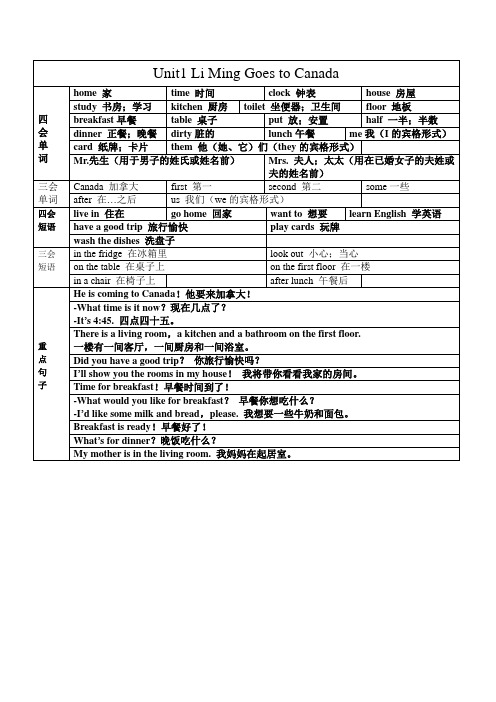
give sb. sth.给某人某物
buy sth. for sb.为某人买某物
重
点
句
子
On a holiday , people don’t work .Children don’t go to school.在节日里,人们不上班,孩子们不上学。
He is a merry man in red clothes.他是一个穿红色衣服的快乐的人。
一楼有一间客厅,一间厨房和一间浴室。
Did you have a good trip?你旅行愉快吗?
I’ll show you the rooms in my house!我将带你看看我家的房间。
Time for breakfast!早餐时间到了!
-What would you like for breakfast?早餐你想吃什么?
go home回家
want to想要
learn English学英语
have a good trip旅行愉快
play cards玩牌
wash the dishes洗盘子
三会
短语
in the fridge在冰箱里
look out小心;当心
on the table在桌子上
on the first floor在一楼
me我(I的宾格形式)
card纸牌;卡片
them他(她、它)们(they的宾格形式)
Mr.先生(用于男子的姓氏或姓名前)
Mrs.夫人;太太(用在已婚女子的夫姓或夫的姓名前)
三会
单词
Canada加拿大
first第一
second第二
some一些
after在…之后
冀教版六年级英语上册期末复习重点
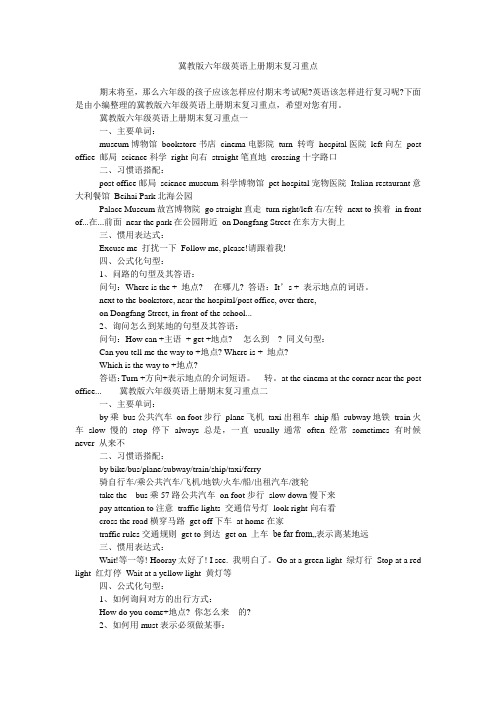
冀教版六年级英语上册期末复习重点期末将至,那么六年级的孩子应该怎样应付期末考试呢?英语该怎样进行复习呢?下面是由小编整理的冀教版六年级英语上册期末复习重点,希望对您有用。
冀教版六年级英语上册期末复习重点一一、主要单词:museum博物馆bookstore书店cinema电影院turn 转弯hospital医院left向左post office 邮局science科学right向右straight笔直地crossing十字路口二、习惯语搭配:post office邮局science museum科学博物馆pet hospital宠物医院Italian restaurant意大利餐馆Beihai Park北海公园Palace Museum故宫博物院go straight直走turn right/left右/左转next to挨着in front of...在...前面near the park在公园附近on Dongfang Street在东方大街上三、惯用表达式:Excuse me 打扰一下Follow me, please!请跟着我!四、公式化句型:1、问路的句型及其答语:问句:Where is the + 地点? ···在哪儿? 答语:It’s + 表示地点的词语。
next to the bookstore, near the hospital/post office, over there,on Dongfang Street, in front of the school...2、询问怎么到某地的句型及其答语:问句:How can +主语+ get +地点? ···怎么到···? 同义句型:Can you tell me the way to +地点? Where is + 地点?Which is the way to +地点?答语:Turn +方向+表示地点的介词短语。
六年级上册英语冀教版知识要点
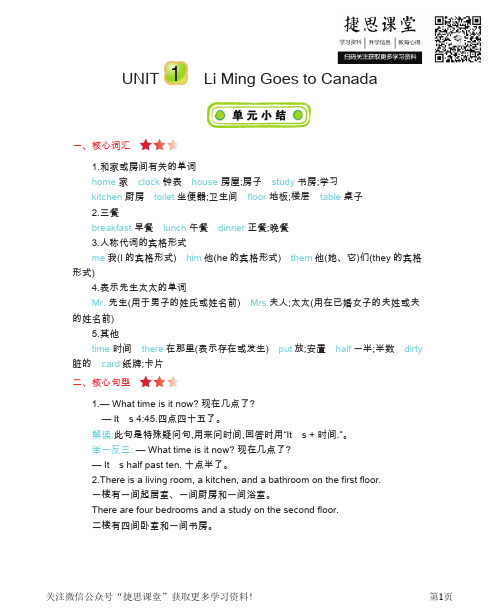
UNIT Li Ming Goes to Canada一、核心词汇1.和家或房间有关的单词home家clock钟表house房屋;房子study书房;学习kitchen厨房toilet坐便器;卫生间floor地板;楼层table桌子2.三餐breakfast早餐lunch午餐dinner正餐;晚餐3.人称代词的宾格形式me我(I的宾格形式)him他(he的宾格形式)them他(她、它)们(they的宾格形式)4.表示先生太太的单词Mr.先生(用于男子的姓氏或姓名前)Mrs.夫人;太太(用在已婚女子的夫姓或夫的姓名前)5.其他time时间there在那里(表示存在或发生)put放;安置half一半;半数dirty 脏的card纸牌;卡片二、核心句型1.—What time is it now?现在几点了?—It s4:45.四点四十五了。
解读:此句是特殊疑问句,用来问时间,回答时用“It s+时间.”。
举一反三:—What time is it now?现在几点了?—It s half past ten.十点半了。
2.There is a living room,a kitchen,and a bathroom on the first floor.一楼有一间起居室、一间厨房和一间浴室。
There are four bedrooms and a study on the second floor.二楼有四间卧室和一间书房。
解读:there be句型用于表达某处有(存在)某人或某物。
当there be后面跟可数名词单数或不可数名词时,be动词用is,当后面跟可数名词复数形式时,be动词用are。
当句子中有几个并列的主语时,be动词的形式要与离其最近的一个主语在数上保持一致,此种用法被称为“就近原则”。
举一反三:There is a pen and ten pencils on the desk.桌子上有一支钢笔和十支铅笔。
冀教版六年级英语上册知识点总结

冀教版六年级英语上册知识点总结1. Unit 1:(1) 主要句型: he/she is…, this/that is…, what is this/that?(2) 语言功能:介绍人物(3) 动词形式:he/she is,isn't(4) 听说词汇:teacher,student,nurse,engineer,doctor,dentist(5) 读写词汇:pronouns,jobs2. Unit 2:(1) 主要句型: What color is…?, It's…(2) 语言功能:描述物体的颜色(3) 动词形式:be(4) 听说词汇:yellow,orange,green,blue,purple,red,white,black(5) 读写词汇:colors3. Unit 3:(1) 主要句型: How old are you? I'm…(2) 语言功能:询问年龄(3) 动词形式:be(4) 听说词汇:thirteen,fourteen,fifteen,sixteen,seventeen,eighteen(5) 读写词汇:ages4. Unit 4:(1) 主要句型: What's your hobby? I like…(2) 语言功能:介绍兴趣爱好(3) 动词形式:like(4) 听说词汇:listening to music, playing video games, playing sports, reading books(5) 读写词汇:hobbies5. Unit 5:(1) 主要句型: What do you want to be? I want to be a …(2) 语言功能:谈论未来职业(3) 动词形式:want(4) 听说词汇:nurse, pilot, teacher, engineer, scientist, doctor, vet(5) 读写词汇:jobs6. Unit 6:(1) 主要句型: What time do you …? I … at…(2) 语言功能:询问时间(3) 动词形式:do, get up, have lunch, have dinner(4) 听说词汇:7:00, 8:00, 9:00, 11:30, 12:30, 18:00, 19:20(5) 读写词汇:times7. Unit 7:(1) 主要句型: What can you do? I can …(2) 语言功能:说明自身能力(3) 动词形式:can(4) 听说词汇:sing, dance, draw, paint, play an instrument, cook(5) 读写词汇:abilities。
冀教版六年级上册英语全部知识点
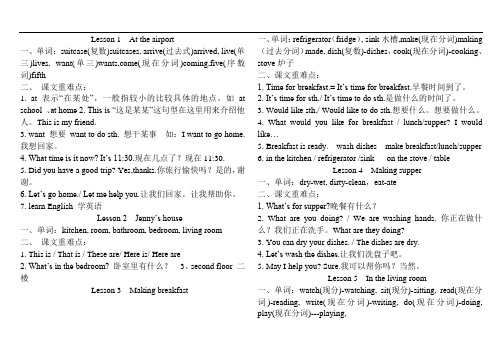
Lesson 1 At the airport一、单词:suitcase(复数)suitcases, arrive(过去式)arrived, live(单三)lives, want(单三)wants,come(现在分词)coming,five(序数词)fifth二、课文重难点:1. at表示“在某处”,一般指较小的比较具体的地点。
如at school 、at home2. This is “这是某某”这句型在这里用来介绍他人。
This is my friend.3. want 想要want to do sth. 想干某事如:I want to go home.我想回家。
4. What time is it now? It’s 11:30.现在几点了?现在11:30.5. Did you have a good trip? Yes,thanks.你旅行愉快吗?是的,谢谢。
6. Let’s go home./ Let me help you.让我们回家。
让我帮助你。
7. learn English 学英语Lesson 2 Jenny’s house一、单词:kitchen, room, bathroom, bedroom, living room二、课文重难点:1. This is / That is / These are/ Here is/ Here are2. What’s in the bedroom? 卧室里有什么?3、second floor 二楼Lesson 3 Making breakfast 一、单词:refrigerator(fridge), sink水槽,make(现在分词)making (过去分词)made, dish(复数)-dishes,cook(现在分词)-cooking、stove炉子二、课文重难点:1. Time for breakfast.= It’s time for breakfast.早餐时间到了。
六年级上册英素材语重点归纳 冀教版.doc
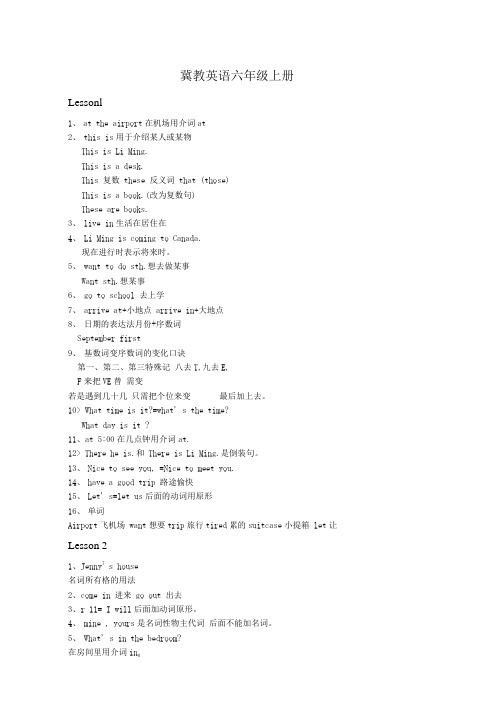
冀教英语六年级上册Lessonl1、at the airport在机场用介词at2、this is用于介绍某人或某物This is Li Ming.This is a desk.This 复数these 反义词that (those)This is a book.(改为复数句)These are books.3、live in生活在居住在4、Li Ming is coming to Canada.现在进行时表示将来时。
5、want to do sth.想去做某事Want sth.想某事6、go to school 去上学7、arrive at+小地点arrive in+大地点8、日期的表达法月份+序数词September first9、基数词变序数词的变化口诀第一、第二、第三特殊记八去T,九去E,F来把VE替需变若是遇到几十几只需把个位来变最后加上去。
10> What time is it?=what' s the time?What day is it ?11、at 5:00在几点钟用介词at.12> There he is.和There is Li Ming.是倒装句。
13、Nice to see you, =Nice to meet you.14、have a good trip 路途愉快15、Let' s=let us后面的动词用原形16、单词Airport飞机场want想要trip旅行tired累的suitcase小提箱let让Lesson 21、Jenny7 s house名词所有格的用法2、come in 进来go out 出去3、r 11= I will后面加动词原形。
4、mine , yours是名词性物主代词后面不能加名词。
5、What' s in the bedroom?在房间里用介词in o6、show sb. Sth. =show sth. to sb.7、单词House房屋show 出示room房间living room 起居室Kitchen 厨房bathroom 浴室bedroom 卧室Lesson3Making Breakfast 1、It' s time for= It1 s time to doIt' s time for breakfast, = It' s time to have breakfast.2、What time is it ?=What' s the time?3、would like sth. /would like to do sth.4、What would you like for breakfast?介词for.5、on the stove 介词on6、be doing正在干什么7、cold-hot inside-outside8、dish 复数dishes9、put…on…10> in the sink 介词in11、Breakfast is ready.Be ready to do sth. =be ready for sth.Lesson 41、dirty-clean2、on your hands介词on的用法3、can后加动词原形4、need to do sth.5、help sb. do sth.6、tooth-teeth foot-feet7、on Sunday在星期几用介词onSunday Monday Tuesday Wednesday Thursday Friday Saturday Lesson 5making supper1、supper 晚饭dinner 正餐2、What7 s for supper?介词for 的用法。
冀教版小学六年级上册英语重点归纳 全册

冀教版小学六年级上册英语重点归纳全册something2、toast面包片3、butter黄油jam果酱4、pour倒入5、fry煎boil煮6、eggs的复数形式7、cut切slice切片8、add加入9、salt盐pepper胡椒粉10、单词Breakfast早餐toast面包片butter黄油jam果酱egg鸡蛋pan平底锅fry煎boil煮Lesson 4.At the Supermarket1、supermarket超市2、XXX。
买某物3、How much is it。
它多少钱?4、XXX贵的cheap便宜的5、pay付款6、change零钱7、shopping购物8、单词XXX买expensive贵的cheap便宜的pay付款change零钱shopping购物Lesson 5.At the Zoo1、zoo动物园2、animal动物3、feed喂养4、watch观看5、cage笼子6、XXX大象7、XXX猴子giraffe长颈鹿zebra斑马8、单词Zoo动物园animal动物feed喂养watch观看cage笼子XXX狮子XXX老虎XXX大象XXX猴子giraffe长颈鹿zebra斑马It is time to have breakfast。
What is the time。
Would youlike something for breakfast。
The stove is on。
What are you doing。
Is it cold or hot outside。
We need to wash the dishes and put them in the XXX is ready。
Be ready to eat。
Lesson 4: Our hands are dirty。
We need to clean them。
We can help each other。
We need to brush our teeth and wash our feet。
冀教版六年级英语上册知识点总结.docx

小升初毕业班毕业升学总复习冀教版六年级英语上册知识点总结第一元一、: live( 三 )lives, want( 三 )wants, half kitchen house toilet bedroom,living room bathroom study (复数 studies) fridge dish(复数 dishes)反: dry-wet, dirty-clean,come(在分 ) coming make(在分 )making cook(在分 )-cookingwatch(在分 )-watching sit(在分 )-sitting read(在分 )-reading,write(在分 )-writing do(在分 )-doing play(在分 )---playing,二、文重点:1. at+小的地点如 at school 、 at home in+大地点in China in Beijing2.This is “ 是⋯ .”用来介他人。
This is my friend, Li Ming.3.want 想要 want to do ⋯想干⋯ .. 如: I want to fly kites. 我想放筝。
Ming ’splane will arrive at five o’ clock. 几点几分用 at5. What time is it now It ’ s half past five.在几点了?在5:30.6.Did you have a good trip Yes, thanks. but ’I m tired 你旅行愉快?是的,。
但是我有些累。
7.Let’ s go home./ Let me help you. 我回家。
我帮助你。
8.learn English/Chinese 学英 /9.This is / That is / These are/ Here is/ Here arewill show you the rooms in my house.我将你参房子的各个房。
冀教版六年级上册英语全部知识点
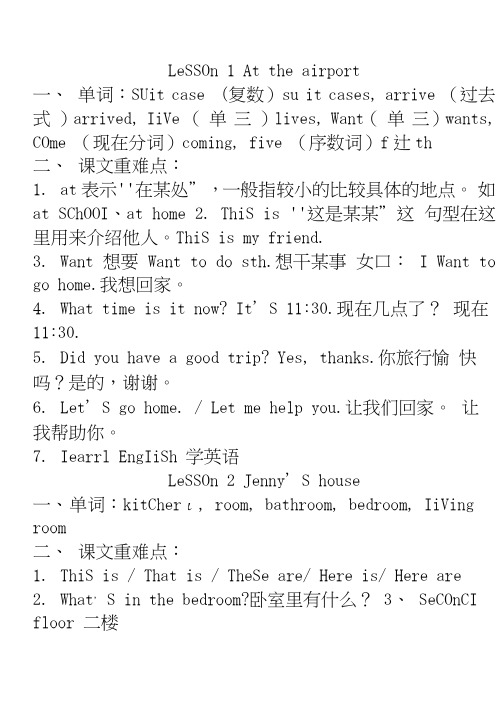
LeSSOn 1 At the airport一、单词:SUit case (复数)su it cases, arrive (过去式)arrived, IiVe (单三)lives, Want(单三)wants, COme (现在分词)coming, five (序数词)f辻th二、课文重难点:1.at表示''在某处”,一般指较小的比较具体的地点。
如at SChOOI、at home2. ThiS is ''这是某某”这句型在这里用来介绍他人。
ThiS is my friend.3.Want 想要Want to do sth.想干某事女口:I Want to go home.我想回家。
4.What time is it now? It' S 11:30.现在几点了?现在11:30.5.Did you have a good trip? Yes, thanks.你旅行愉快吗?是的,谢谢。
6.Let' S go home. / Let me help you.让我们回家。
让我帮助你。
7.Iearrl EngIiSh 学英语LeSSOn 2 Jenny' S house一、单词:kitCherι, room, bathroom, bedroom, IiVing room二、课文重难点:1.ThiS is / That is / TheSe are/ Here is/ Here are2.What, S in the bedroom?卧室里有什么?3、SeCOnCI floor 二楼LeSSOn 3 Making breakfast一、单词:refrigerator (fridge), Sink 水槽,make (现在分词)making(过去分词)made, dish(复数)-dishes, COOk (现在分词)-COOking> StOVe 炉子二、课文重难点:1.Time for breakfast. = It' S time for breakfast. 早餐时间到了。
- 1、下载文档前请自行甄别文档内容的完整性,平台不提供额外的编辑、内容补充、找答案等附加服务。
- 2、"仅部分预览"的文档,不可在线预览部分如存在完整性等问题,可反馈申请退款(可完整预览的文档不适用该条件!)。
- 3、如文档侵犯您的权益,请联系客服反馈,我们会尽快为您处理(人工客服工作时间:9:00-18:30)。
一单元一、单词: live(单三)lives, want(单三)wants, half kitchen house toiletbedroom,living room bathroom study (复数studies) fridge dish(复数dishes)反义词:dry-wet, dirty-clean,come(现在分词) coming make(现在分词)making cook(现在分词)-cookingwatch(现在分词)-watching sit(现在分词)-sitting read(现在分词)-reading,write(现在分词)-writing do(现在分词)-doing play(现在分词)---playing,二、课文重难点:1. at+较小的地点如at school 、at home in+大地点 in China in Beijing2. This is “这是….”用来介绍他人。
This is my friend, Li Ming.3. want 想要 want to do …想干….. 如:I want to fly kites.我想放风筝。
4.Li Ming’s plane will arrive at five o’clock.几点几分用at5. What time is it now? It’s half past five.现在几点了?现在5:30.6. Did you have a good trip? Yes, thanks. but I’m tired你旅行愉快吗?是的,谢谢。
但是我有些累。
7. Let’s go home./ Let me help you.让我们回家。
让我帮助你。
8. learn English/Chinese 学英语/汉语9. This is / That is / These are/ Here is/ Here are10.I will show you the rooms in my house.我将领你们参观房子的各个房间。
11.on the first/second floor 在一/二楼(在几楼要用序数词和on)12.I make lunch in the kitchen 我在厨房做午饭13.I do my homework in the study.我在书房做作业14. Time for breakfast.= It’s time for breakfast.早餐时间到了。
15. It’s time for sth./ It’s time to do sth .是做什么的时间了。
It is time for dinner=it is time to have dinner.16. Would like sth./ Would like to do sth.想要什么。
想要做什么。
17. What would you like for breakfast / lunch/dinner? (三餐前面要用for)I would like…for breakfast / lunch/dinner?(通常would like 问would like答)18. Breakfast is ready. wash dishes make breakfast/lunch/dinner19. mum is cooking eggs in the kitchen 妈妈正在厨房煎鸡蛋。
20.Let’s put some dishes on the table.让我们把盘子放到桌子上。
21.I only ate an apple for lunch.午饭我只吃了一个苹果。
22. What’s for supper?晚餐有什么?23. What are you doing? / We are washing hands. 你正在做什么?我们正在洗手。
What are they doing? (通常doing 问 ing答)24. Now the dishes are clean and dry.现在盘子洁净干爽。
25. I wash the dirty dishes.我洗脏盘子。
26. May I help you? Sure.我可以帮你吗?当然。
27.watch TV / read the newspaper/write a letter28. Do you like this show? Yes,I do/No,I don’t.(通常do问 do 答)29. I am sitting at a small table.我正坐在小桌子旁边二单元一、单词:always often sometimes never bus stop bus driver school bus subject class math science art PE music temperature,(反义词)hot---cold, ill-----healthy健康的名词复数规则1.一般情况下,直接加-s,如:book-books, bag-bags, cat-cats, bed-beds2.以s. x. sh. ch结尾,加-es,如:bus-buses, box-boxes, brush-brushes, watch-watches 3.以“辅音字母+y”结尾,变y为i, 再加-es,如:family-families, city - cities 4.以“f或fe”结尾,变f或fe为v, 再加-es,如:leaf-leavesdegree(复数)degrees box—boxes bus—busestomato –tomatoes potato---potatoes photo-----photos (土豆,西红柿+es,其余+s)man(复数)---men, woman(复数)---women, child(复数)---children foot(复数)---feet2. 频率副词用法:一般都放在动词前,am/ is/ are的后面。
如:He never wears dresses./ he is always late.二、课文重难点:1.I always have my umbrella on a rainy day.我总是在下雨时打伞。
2.Here comes the school bus.校车来了3. I live too far from my school 我住的离学校很远。
on the school bus.在校车上4. Do you go to school by …?你……去上学?5. Jenny often goes to school by bus.詹妮经常坐公交车去上学Sometimes she rides her bike. she never walks.有时她骑自行车。
她从不步行去上学。
一般现在时当主语为第三人称单数(he, she, it)时,要用动词的第三人称单数,主语为复数时,要用动词原型。
如:Mary likes Chinese. We like cat。
动词+s的变化规则:1)一般情况下,直接加-s,如:cook-cooks, bring--brings2)以s. x. sh. ch. o结尾,加-es,如:guess-guesses, wash-washes, watch-watches, go-goes3)以“辅音字母+y”结尾,变y为i, 再加-es,如:study-studies6. Where are you from? I am from China/ Bao Ding来自中国保定。
7、What subjects do you have in your school?你在学校有哪些科目?8、How many classes do you have each school day? 每天你在学校有多少节课?Three classes in the morning and two in the afternoon.上午三节,下午两节。
9. How’s the weather today? It’s rainy.今天天气怎样?多雨。
10. What’s the temperature? It’s ten degrees.气温多少度?十度。
What’s the chicken’s temperature?鸡的体温温是多少?11.The temperature of a healthy chicken is always 41.5degrees.健康的鸡的体温总是41.5度。
12. This/That is a/an/one…+单个名词These/ Those are (some/many) …+名词复数13. These men /These women/ These children are young /singing/playing.14. Do you always…? / Does he often…15. walk to school / help his mother / ride my bike / do your homework16. Let’s put…for…Let’s put an A/O/S/N for always/often/sometimes/never. 三单元单词: spring, summer, autumn, winter, scarf, ice, winter clothesput(现在分词)putting、skate滑冰 think, teach,fall down fun, favouriteleaf(复数)---leaves, snowman(复数) snowmen,,反义词put on ---take off up---down teach----learnrain(形容词) rainy, wind (形容词) windy, sun (形容词)sunny,snow(形容词) snowy cloud (形容词) cloudy二、课文重难点:1. There are four seasons in a year.一年有四季There is ice and snow in winter.冬天有冰和雪。
2.The summer sun is hot.夏日的骄阳似火。
3.The leaves turn red and yellow in autumn.叶子在秋天变成红色和黄色4. What a hot, sunny day!多么热、晴朗的天啊!5. Jenny and Li Ming are going out to play with Danny.詹妮和李明要出去和丹尼玩。
